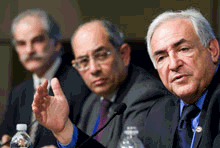
Typical street scene in Santa Ana, El Salvador. (Photo: iStock)
IMF Survey: World Finance Chiefs Back Moves to Support Recovery from Crisis
April 25, 2009
- IMF policy committee backs moves to recover from global recession
- Supports big boost in IMF’s resources to combat economic crisis
- IMF considers bond issue as vehicle for countries to contribute to Fund
World financial leaders said they are committed to taking the needed action to ensure recovery from the deepest global recession since the Great Depression and backed moves to greatly expand the lendable resources of the International Monetary Fund (IMF) to combat the crisis and provide a social safety net for the world’s poorest.

Market in Jakarta, Indonesia: global growth is projected to return in 2010, but more sluggishly than past recoveries (photo: Bagus Indahono/epa/Corbis)
IMF POLICY-SETTING BODY
The IMF’s policy steering body, the 24-member International Monetary and Financial Committee (IMFC), underlined the central role of the Fund in helping to restore growth and in regularly monitoring the policy actions taken by governments around the world to assess if more action is needed.
IMFC Chairman Youssef Boutros-Ghali, the Egyptian Finance Minister, said participants could see signs of future recovery. "We have serious problems. We are taking very serious measures. But things are beginning to look up. Carefully, cautiously, we can say that there is a break in the clouds."
IMF Managing Director Dominique Strauss-Kahn said the pace of global recovery depends significantly on the effectiveness of measures to dispose of bad loans currently on the books of major banks.
Unprecedented policy response
Finance ministers, central bank governors, and development ministers gathered in Washington for the Spring Meetings of the IMF and World Bank amid the worst crisis to hit the global economy since the twin institutions were established toward the end of World War II.
An unprecedented policy response to the global economic crisis—including the recent expansion of resources for international institutions and the IMF’s enhanced lending framework—is gradually beginning to restore market confidence, the IMF said.
But in its semiannual Global Financial Stability Report, released April 21, the IMF warned that the challenges to restoring financial stability remain significant.
“Continued decisive and effective action is needed to preserve and strengthen these first signs of improvement, and to help provide a more stable and resilient platform for sustained global growth,” José Viñals, Financial Counsellor and Director of the IMF’s Monetary and Capital Markets Department, said.
Growth to reemerge next year
The latest forecast by the IMF in its World Economic Outlook shows the global economy contracting in 2009 by 1.3 percent. While the rate of contraction should moderate from the second quarter of 2009 onward, output per capita is projected to decline in countries representing three-quarters of the global economy. Growth is projected to reemerge in 2010, but at 1.9 percent it would be sluggish relative to past recoveries.
IMF Chief Economist Olivier Blanchard told reporters that the world economy was being battered by competing crosscurrents, with the collapse in confidence and demand continuing to pull the economy down and government stimulus measures and natural stabilization mechanisms pulling the economy up.
“This is not the time for complacency, and the need for strong policies, both on the macro and especially on the financial fronts, is as acute as ever. But, with such policies in place, there is light at the end of this long tunnel. World growth can turn positive by the end of this year, and unemployment can start decreasing by the end of next year.”

IMF head Strauss-Kahn (r) with IMFC Chairman Boutros-Ghali (c), IMF First Deputy Managing Director Lipsky at IMFC press briefing (photo: IMF)


